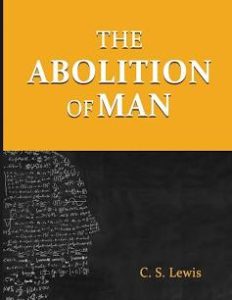
C.S. Lewis
Recommendation: 3/5
Description of author: C.S. Lewis (1898-1963) was a Fellow and Tutor in English literature at Oxford University until 1954, when he was elected to the Chair of Medieval and Renaissance English at Cambridge University, a position he held until his retirement. He wrote more than thirty books. Evangelicals seem to be especially enamored with Lewis because of his apologetic writings. But Lewis, who denied several fundamental doctrines, was no evangelical.
Comments: Lewis argues in three lectures (chapters) that the abolition of man will take place when man successfully overthrows traditional values. According to Lewis, man is subject to Natural Law even though he cannot explain it or understand where it comes from. This Natural Law, he refers to as the Tao, a term borrowed from the Chinese (p. 18) and synonymous with Traditional Morality, First Principles of Practical Reason, and the First Platitudes (p. 43). According to Lewis, the Tao is common, to one degree or another, to all ancient cultures including Pagan, Oriental, Christian, and Jewish. In the Appendix, Lewis gives illustrations of the Tao from Ancient Egyptian, Babylonian, Chinese, Greek, Roman, Jewish, and Christian literature. The illustrations are listed under eight general headings: (1) The Law of General Beneficence; (2) The Law of Special Beneficence; (3) Duties to Parents, Elders, Ancestors; (4) Duties to Children and Posterity; (5) The Law of Justice; (6) The Law of Good Faith and Veracity; (7) The Law of Mercy; and (8) The Law of Magnanimity. When man finally does explain the Tao away and is no longer subject to it, he will no longer be man (p. 64). In the first chapter, ‘Men without Chests,’ Lewis explains the importance of education in teaching values. He is concerned that modern education is educating values out of our children. The closing words of this chapter are a good summary of the chapter (and could also summarize our American public school system): In a sort of ghastly simplicity we remove the organ and demand the function. We make men without chests and expect of them virtue and enterprise. We laugh at honor and are shocked to find traitors in our midst. We castrate and bid the geldings be fruitful (p. 26). In the second chapter, ‘The Way,’ he argues that apart from these First Principles there can be no value at all: The rebellion of new ideologies against the Tao is a rebellion of the branches against the tree: if the rebels could succeed they would find that they had destroyed themselves. The human mind has no more power of inventing a new value than of imagining a new primary color, or indeed, of creating a new sun and a new sky for it to move in (p. 44). To step outside the Tao, is to step outside of the concept of value. This leads to the third and final chapter, ‘The Abolition of Man,’ in which he explains the great danger of explaining away Traditional Morality: We have been trying, like Lear to have it both ways: to lay down our human prerogative and yet at the same time to retain it. It is impossible. Either we are rational spirit obliged for ever to obey the absolute values of the Tao, or else we are mere nature to be kneaded and cut into new shapes for the pleasures of masters who must, by hypothesis, have no motive but their own natural impulses. Only the Tao provides a common human law of action which can over-arch rulers and ruled alike. A dogmatic belief in objective value is necessary to the very idea of a rule which is not tyranny or an obedience which is not slavery (p. 73). He closes the book with an interesting paragraph: You cannot go on seeing through things for ever. The whole point of seeing through something is to see something through it. It is good that the window should be transparent, because the street or garden beyond is opaque. How if you saw through the garden too? It is no use trying to see through first principles. If you see through everything, then everything is transparent. But a wholly transparent world is an invisible world. To see through all things is the same as not to see (p. 81). At first glance this seems like a brilliant statement, but in reality it is untrue. God sees through all things, including First Principles, yet He is not blind. This helps us to see what Lewis never mentions, namely, that man’s rebellion against Traditional Morality is man’s rebellion against God. It is man wanting to be God and to define his own world (cf. Psalm 2:1-3). In the end Lewis’ analysis is unsatisfactory and disappointing because he does not build his argument on Divine Revelation, i.e. Scripture, the only sure ground of knowledge and morality. He leaves us in mid-air.